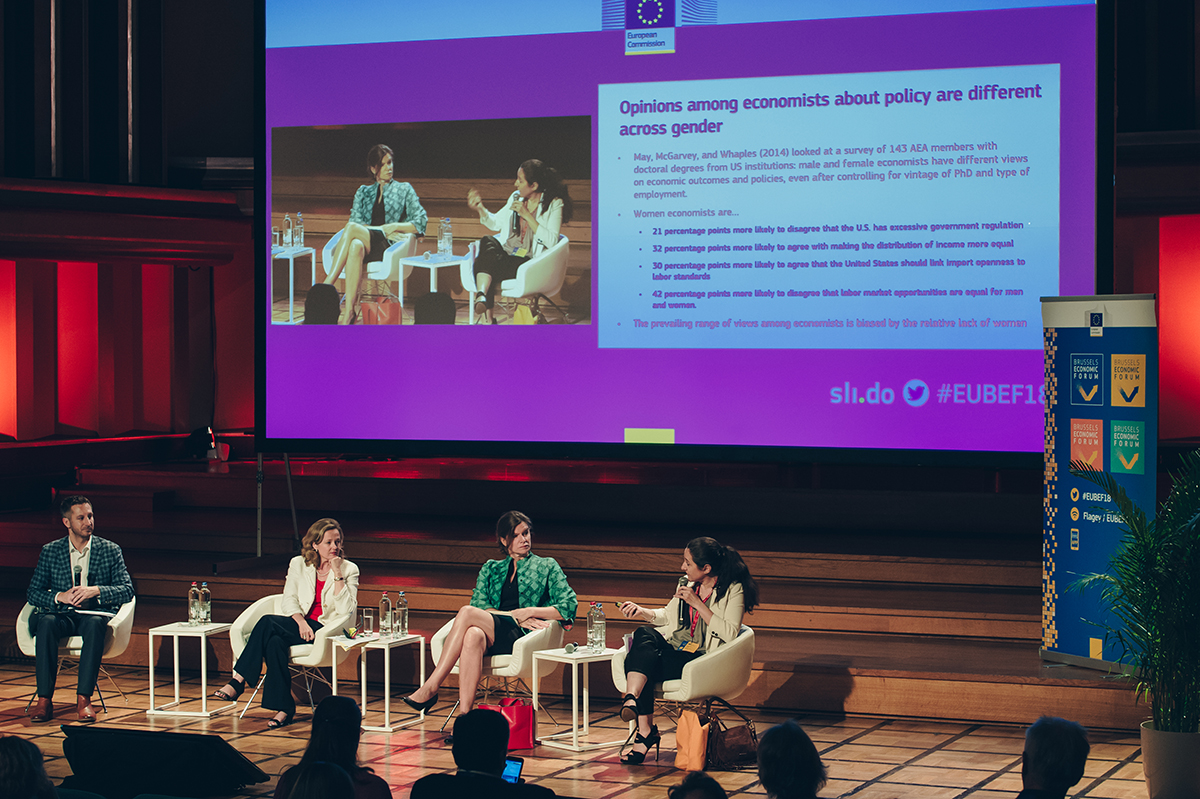Womenomics: “Not everything that counts can be counted and not everything that can be counted counts.”
Today’s economic systems and models do not take into consideration the economic value of activities such as home care for the sick, elderly and children. An over-reliance on mathematical modelling gives a false sense of certainty. Women are underrepresented in a discipline that has a significant impact on public policy.
These are some of the major themes to emerge from the Brussels Economic Forum breakfast debate, “Womenomics: exploring the gender dimension of economics”, which opened the conference.

Prof Mariana Mazzucato, Professor in the Economics of Innovation and Public Value at UCL, and Director of the Institute for Innovation and Public Purpose, opened the discussion. She noted that economic theory does not accurately consider the value of many activities. Traditional measures such as GDP, with its emphasis on prices, do not capture economically valuable activities such as care work or the economic costs of pollution.
Women produce value for society, beyond activities such as care. They are a wider creative force. Economic statistics should capture these activities.
Emmanuelle Auriol, Professor at Toulouse School of Economics and Chair of the Women in Economics Committee of the European Economics Association, said that women are underrepresented in the economics profession and receive lower pay. Moreover, in contrast to other male-dominated academic areas such as Mathematics, the gender gap in economic is getting worse, she said. Data from the US indicate that some areas of economic research are particularly male dominated, while women are more prevalent in areas such as healthcare and development economics. Economic policies and outcomes divide genders: female economists are far more likely to disagree that labour market opportunities are equal for men and women.
The gender imbalance has wider implications. Economists make a powerful input into policy and can influence decisions, she added.
Nadia Calviño, Director-General for Budget, European Commission, offered three observations from 30 years personal experience as an economist. Economics is a social science but the focus on mathematical modelling in the discipline over the last few decades means that it has come to be treated as if it were engineering. This approach “gives us a false sense of safety”, she said.
Models simplify reality. Important elements such as health, the environment and inequality are absent. These are relevant indicators. Finally, she identified a sense of complacency in the profession. Just because a group agrees on something does not necessarily mean that is the way ahead. As she put it: “Not everything that counts can be counted and not everything that can be counted counts.”
In 14 years as a senior Commission manager in traditionally male dominated areas such as competition and financial services, she believes female presence has made a difference – both in decision making and organisational dynamics. This diversity should be encouraged so issues are examined from different perspectives. “Whenever you have a diverse environment, you will take better decisions.” Diversity of views and professional and academic backgrounds were also important, she added.

In the discussion, Prof Mazzucato emphasised the need for policy makers not simply to regulate, but to have a clear idea of the society they wish to see emerge from change. They should see the broader picture and, as with the digital economy, shape the emerging environment.
The Commission’s emphasis on mission-oriented innovation reflects this approach. “Top down” frames the wider mission objective. “Bottom up” provides ways to achieve that goal. The first step is to decide who should be involved in the exercise. “This is something I want women to have a very strong voice in,” she stressed.
Prof Auriol admitted she had no magic wand to redress the imbalance of females in the economics profession. She rejected the idea of a token woman on a committee, as it demands too much time for little purpose. The only way forward she saw was to collect relevant data and increase understanding of the problem.
All three panellists strongly supported a recent initiative, brought to their attention from the floor. In Spain, 500 economists now refuse to sit on a men only panel. Ms Calviño, fully supporting the need for more female visibility and gender equality, raised the macro-economic implications. “By not having equal treatment of half the population, you may miss the potential for growth in the future,” she said.
Prof Mazzucato tabled two other challenges to modern economics. The term ‘structural reform’ should be debunked and not associated solely to the labour market, as it is for many now, but include other types of reform.
In the same vein, a far wider curriculum than at present should be taught to economics students. This would give them an insight into the development of economic theory and a better grasp of the range of tools at their disposal.
Speaking from the floor, Marco Buti, Director-General for Economic and Financial Affairs, European Commission, pointed out that in a spirit of gender equality 46% of speakers at this year’s Brussels Economic Forum were female.
Speeches
- Womenomics: exploring the gender dimension of economics
 (361 Kb) (Emmanuelle Auriol)
(361 Kb) (Emmanuelle Auriol)
